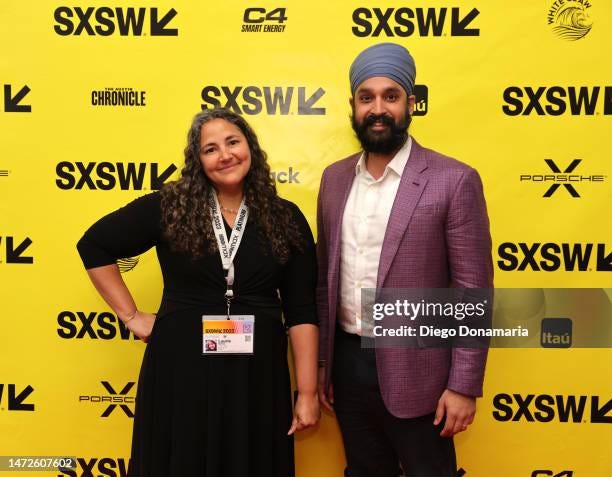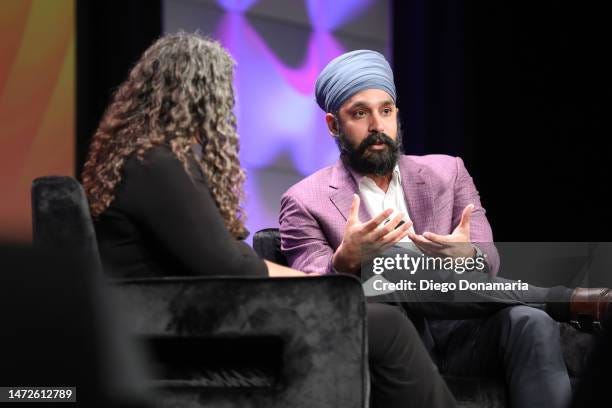A few years ago, when I was invited to deliver the opening address at SXSW, the organizers asked if I’d be willing to be in conversation with one of their other main stage speakers. They suggested Laurie Santos—a professor at Yale University and host of an incredible podcast called The Happiness Lab—and my life hasn’t really been the same since.
It was the largest audience I’d ever spoken to, with a packed assembly hall at the Austin Convention Center, and two overflow rooms, each with thousands of people. I also had no idea that Laurie’s show is one of the biggest in the country, and that our conversation would be heard by people all over the world.
What really struck me though, and something I often feel when being interviewed, is that the person who was asking the questions actually had way more to offer than I did. What if I had the chance to interview them instead?!
Enter the John Templeton Foundation, which supported my podcast called Wisdom & Practice, and enter Laurie Santos, who graciously agreed to share some of her wisdom with me. It was such a lovely conversation from which I learned so much—and which I’m excited to share with you here now.
See below to read an excerpt of our conversation, and click here to listen to the whole thing.
Laurie Santos:
There's really interesting scientific evidence that the act of getting curious—of asking about other people’s lived experiences—can be one of the best ways to connect, even across incredibly different ideological and political lines.
There’s some lovely work by a researcher named Josh Kalla on what he calls deep canvassing. He studies this in the context of political canvassing. For example, say you care about immigration rights and you’re going door to door, trying to encourage your friends and neighbors to vote for a pro-immigration policy—something that would support bringing folks into the United States. The question is: what kind of conversations are most effective? A lot of people think that the best approach is perspective sharing, like going door to door and saying, “Let me tell you about this immigrant’s experience and how they benefited from coming to this country,” and so on.
But Josh Kalla’s approach is actually the opposite: it's perspective getting. That’s the idea behind deep canvassing. You go to someone’s door, introduce yourself, and say something like, “I'm here to talk about immigration rights. But before we begin, I want to ask—have you ever had a time in your life when you felt marginalized? A time when you didn’t fit in, or felt like you had to leave a situation or environment?”
And people will say things like, “Yeah, when I started my first job, I didn’t feel like I belonged,” or “A family member of mine had to leave their home because they were in a difficult situation.”
Then, you reflect on that. You get curious, you show compassion. You say, “That sounds really hard.” And then you make the connection: “That’s what immigrants are going through.” Or, if you're canvassing for transgender rights, you might say, “That’s what a trans person might experience in their life.”
It turns out that this kind of canvassing is far more effective—not just at changing people’s votes or opinions, but at helping them feel compassion for others. The empathy doesn’t come from telling your story, you know, it comes from getting curious about their story, and then drawing a connection. So it’s not just a practice that feels better emotionally—it’s functionally better if you want to help people understand perspectives that are different from their own. Even if they don’t change their votes, they start to see someone else’s perspective in a new way.
And that act of connection—it feels good for you, too. It’s not just good in theory. It leads to a whole host of positive emotions. You feel a deeper sense of belonging, you feel more understood, more connected. You feel like you can help someone else.
Simran Jeet Singh:
Yeah, I’m really interested in your framing of positive and negative emotions, especially in light of the mental health crisis we’re seeing in this country and around the world. It's unlike anything we've seen before. What are you observing among young people right now? What are they looking for? What are they struggling with?
You mentioned belonging and connection, especially in a context where so many people feel isolated and shut out. I wonder if you can share more about what you’ve seen firsthand, and what you’re hoping to offer through your work.
Laurie Santos:
The class, Psychology and the Good Life, actually started when I took on a new role at Yale. I became what's called a head of college. Yale is one of those schools that has smaller colleges within the university, and that meant I was living on campus with students, as a faculty member, really participating in student life at a deeper level. I was eating with them in the dining hall, hanging out in the coffee shop. I was just seeing up close what it’s really like to be a young person today. And honestly, I didn’t like what I was seeing.
Like you said, there’s a college student mental health crisis. For listeners who might not know: right now, nationally, more than 40% of college students report being too depressed to function most days. Over 60% say they feel overwhelmingly anxious. And more than 1 in 10 has considered suicide in the last six months. Some people hear stats like that and assume it’s just a few “snowflakes” who can’t handle things—but no, this is a real, national problem. And I was seeing it in my own community. As a professor, I felt like this sort of benevolent aunt to this large group of students, and so many of them were struggling. Sometimes in ways that could literally be lethal, if they were thinking about taking their own lives.
So the class was my attempt to do something about it. What was especially frustrating to me was that my field—psychology—has strategies that can help people feel less burned out, less stressed. There’s so much we know about things people can do to feel better. And I wanted to bring that to students in a way that felt relevant, actionable, and empowering.
Click this link to listen to our full conversation on Wisdom & Practice.





